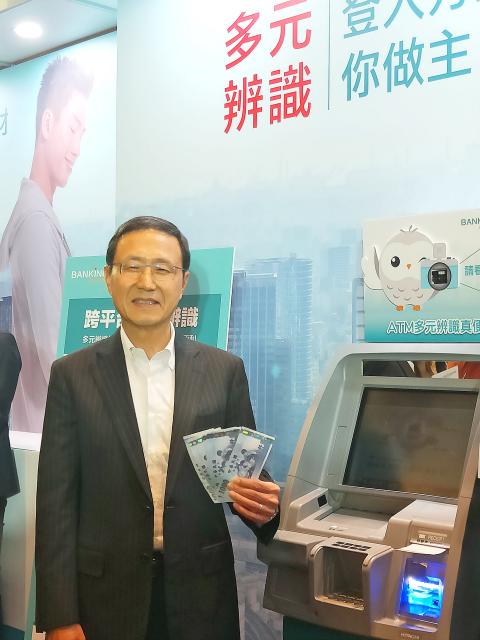CTBC Bank (中國信託銀行) yesterday said it plans to install at least five smart automated teller machines (ATMs) in the nation before the end of this year, after introducing a prototype equipped with facial recognition technology last year.
The new ATMs would be smarter than the bank’s current 5,900 machines, as they would be able to detect whether a user is engaged in suspicious activity or is being manipulated by scammers, CTBC retail banking department executive vice president Amy Yang (楊淑惠) told a news conference in Taipei.
The machines would automatically stop operating if a user is wearing a mask or helmet — two items that are commonly used by money mules, the bank said.

Photo: Lee Ching-hui, Taipei Times
Regular customers who wear masks or helmets should remove them before using the ATMs, it said.
Users who are talking on the phone while using the ATM would be considered a potential scam victim, Yang said.
The machine would issue warnings on the screen asking users if they are being given specific instructions by strangers, she said.
If the user says there is no problem about the phone call, they would be able to continue using the machine, she added.
CTBC said it plans to introduce in July one smart ATM at an unstaffed 7-Eleven store run by President Chain Store Corp (統一超商) in Taipei and another one at the bank’s flagship branch in the city, with the other three to be installed by the end of this year, Yang said.
The bank last year said that it was collaborating with the National Police Agency to stop crimes, such as notifying police when ATMs detect users who resemble criminal suspects.
However, it has halted the cooperation as some bank managers were worried that it might inconvenience innocent users, she said.
“The cooperation might be resumed if the [new ATMs] facial recognition feature proves to be reliable after a trial period,” Yang said.
The lender plans to open two new branches in Taiwan, CTBC Bank president James Chen (陳佳文) said.
Although many banks have closed some branches due to the development of financial technology, CTBC thinks that digital services cannot replace physical outlets, Chen said.

MULTIFACETED: A task force has analyzed possible scenarios and created responses to assist domestic industries in dealing with US tariffs, the economics minister said The Executive Yuan is tomorrow to announce countermeasures to US President Donald Trump’s planned reciprocal tariffs, although the details of the plan would not be made public until Monday next week, Minister of Economic Affairs J.W. Kuo (郭智輝) said yesterday. The Cabinet established an economic and trade task force in November last year to deal with US trade and tariff related issues, Kuo told reporters outside the legislature in Taipei. The task force has been analyzing and evaluating all kinds of scenarios to identify suitable responses and determine how best to assist domestic industries in managing the effects of Trump’s tariffs, he

TIGHT-LIPPED: UMC said it had no merger plans at the moment, after Nikkei Asia reported that the firm and GlobalFoundries were considering restarting merger talks United Microelectronics Corp (UMC, 聯電), the world’s No. 4 contract chipmaker, yesterday launched a new US$5 billion 12-inch chip factory in Singapore as part of its latest effort to diversify its manufacturing footprint amid growing geopolitical risks. The new factory, adjacent to UMC’s existing Singapore fab in the Pasir Res Wafer Fab Park, is scheduled to enter volume production next year, utilizing mature 22-nanometer and 28-nanometer process technologies, UMC said in a statement. The company plans to invest US$5 billion during the first phase of the new fab, which would have an installed capacity of 30,000 12-inch wafers per month, it said. The

Taiwan’s official purchasing managers’ index (PMI) last month rose 0.2 percentage points to 54.2, in a second consecutive month of expansion, thanks to front-loading demand intended to avoid potential US tariff hikes, the Chung-Hua Institution for Economic Research (CIER, 中華經濟研究院) said yesterday. While short-term demand appeared robust, uncertainties rose due to US President Donald Trump’s unpredictable trade policy, CIER president Lien Hsien-ming (連賢明) told a news conference in Taipei. Taiwan’s economy this year would be characterized by high-level fluctuations and the volatility would be wilder than most expect, Lien said Demand for electronics, particularly semiconductors, continues to benefit from US technology giants’ effort

‘SWASTICAR’: Tesla CEO Elon Musk’s close association with Donald Trump has prompted opponents to brand him a ‘Nazi’ and resulted in a dramatic drop in sales Demonstrators descended on Tesla Inc dealerships across the US, and in Europe and Canada on Saturday to protest company chief Elon Musk, who has amassed extraordinary power as a top adviser to US President Donald Trump. Waving signs with messages such as “Musk is stealing our money” and “Reclaim our country,” the protests largely took place peacefully following fiery episodes of vandalism on Tesla vehicles, dealerships and other facilities in recent weeks that US officials have denounced as terrorism. Hundreds rallied on Saturday outside the Tesla dealership in Manhattan. Some blasted Musk, the world’s richest man, while others demanded the shuttering of his